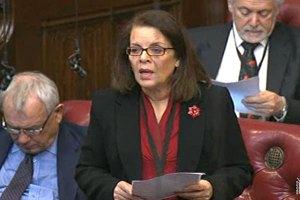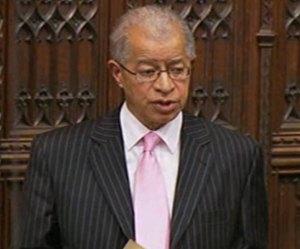 The campaign to save an equality law enshrining Britain’s commitment to work towards the elimination of racism received a boost this week when the coalition peers defied the Government to keep the aspirational statement.
The campaign to save an equality law enshrining Britain’s commitment to work towards the elimination of racism received a boost this week when the coalition peers defied the Government to keep the aspirational statement.
Ministers were defeated by over 50 votes as peers voted to keep Section 3 of the Equality Act which expresses the desire to promote good race relations and end prejudice and hate.
Ethnic Minority Liberal Democrat (EMLD) had lobbied party peers over the plan to scrap Section 3 and on Tuesday former EMLD chair Baroness Meral Hussein-Ece was at the forefront of the battle to preserve the ‘general duty’ on the equality watchdog, the Equality and Human Rights Commission, to work towards an equal Britain.
You can read the debate here and watch it here.
EMLD chair Issan Ghazni expressed delight that several Lib Dem peers had voted for an amendment to save the that part of the Equality Act 2010.
In a letter to Lib Dems ahead of the debate Ghazni wrote that the mission statement was as important as the preamble to the party’s constitution which refers to ‘liberty, equality and community.’
The lobbying effort paid dividends on Tuesday as several Lib Dem peers defied the whip to keep law. The measure, proposed by disabilities campaigner Baroness Jane Campbell of Surbiton, was support by 217 to 166, a majority of 51.
The result puts pressure on Lib Dem MP’s to follow the Lords example when the Enterprise and Regulatory Reform Bill goes back to the House of Commons. EMLD pledged to continue lobbying to ensure MP’s also vote to save the ‘general duty.’
Lib Dem peers who voted to retain the aspirational statement were: L.Addington, L.Avebury, L.Bradshaw, B.Brinton, B.Hussein-Ece, B.Tonge (unwhipped). There were also a number of abstentions including L.Dholakia and L.Hussain.
The debate revealed supporters of the ‘general duty’ from all sides of the House, including Conservative LAhmed of Wimbledon and several crossbenchers.
Labour, who proposed the amendment in the Lords, intend to continue to fight for the ‘general duty’ when the Bill returns to the Commons.
They are likely to raise concerns over several aspects of Britain’s equalities framework that are under threat including Equality Impact Assessments, which all public authorities currently carry out when designing new policies to ensure they do not discriminate.
There are also concerns over severe funding cuts to the Equality and Human Rights Commission.
Speaking in the Lords debate Baroness Meral Hussein-Ece said:
“The Government have a choice between a strong independent body that is committed to promoting and safeguarding our values [or] a watered-down, less independent, weaker institution… without the vision and underpinning that is so important.
“I cannot think of another organisation that does not have some sort of mission statement or a duty to promote or do something. This is the only organisation of its kind in this country. Are we suggesting that the Equality and Human Rights Commission does not need such a mission or values, which were very much fought over and arose as a result of cross-party agreement when the Equality Act 2006 was debated and enshrined?”
The Government suffered a second defeat on Tuesday when Coalition peers again defied the whips to vote to include caste discrimination alongside race, gender, age and disability discrimination.
The Government, represented by ex-BBC boss Conservative minister Baroness Tina Stowell of Beeston, also opposed this proposal but the Lords voted by a majority of over 100 to grant legal protection for lower castes from the Indian sub-continent, especially the Dalit community.
However the coalition chalked up a narrow win by defeating an amendment, proposed by Lib Dem Lord Anthony Lester QC, to save a section of the Equality Act which requires employers to fill out a questionnaire from the employee taking out a discrimination tribunal case.
Former Commission for Racial Equality chair, crossbencher Lord Herman Ouseley, believes that the Government proposal to scrap the questionnaire would disproportionately impact on Black, Asian and other minority communities (BAME) who suffer race discrimination in addition to other forms of prejudice.

Lord Herman Ouseley
He told the Lords:
“I feel [the Government wants] to allow employers to hire and fire without any fear, weakening employees’ rights and reducing the support and representation available to victims of discrimination in the workplace, while making the EHRC weaker.
“This is being done largely on the basis, as argued by the Government, that it is a burden on employers to have to respond to questions being asked by employees about their treatment. “Employees have to get that information to determine whether they have a basis on which to go forward with a case of unlawful discrimination. Without that information, they literally have no basis for doing so.
“Many employers clearly support the reform put forward here-getting rid of the questionnaire-because they do not want to be accountable for their actions or to respond to questionnaires in which they have to provide explanations for their actions. They regard these questionnaires, as the government side have argued in taking this forward, as a nuisance.”
However the Government narrowly defeated the bid to retain the employer questionnaire by 179 to 167 votes.
Labour withdrew an amendment aimed at saving Equality Impact Assessments after making a mess of presenting their case. Before the amendment was withdrawn Baroness Hussein-Ece said:
“It seems to me there is an awful lot of misinformation regarding the benefits of having an equality impact assessment as part of the public sector equality duty. However, it is an important tool and has been successfully used to assess the impact of public services and of government policy on vulnerable people.
“Of course, there is always room for improvement… however, we must ensure that equality and the right of access to services is open to all, regardless of who they are or their background.
“It provides an important evidence base to support provision that is effective and efficient and ensures that services provide value for money, so it has served an important purpose.”
The failure to have a vote on Equality Impact Assessments has not deflated EMLD who intend to redouble their efforts to lobby for this element of the Equality Act to also be preserved, along with the ‘general duty’ mission statement to work towards the elimination of racism and other forms of discrimination.
By Lester Holloway @brolezholloway
